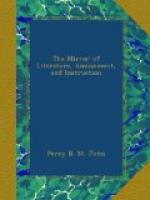It is an interesting circumstance in the habits of the ancient Romans, that their journeys were pursued very much in the night-time, and by torchlight. Cicero, in one of his letters, speaks of passing through the towns of Italy by night, as a serviceable scheme for some political purpose, either of avoiding too much to publish his motions, or of evading the necessity (else perhaps not avoidable) of drawing out the party sentiments of the magistrates in the circumstances of honour or neglect with which they might choose to receive him. His words, however, imply that the practice was by no means an uncommon one. And, indeed, from some passages in writers of the Augustan era, it would seem that this custom was not confined to people of distinction, but was familiar to a class of travellers so low in rank as to be capable of abusing their opportunities of concealment for the infliction of wanton injury upon the woods and fences which bounded the margin of the high-road. Under the cloud of night and solitude, the mischief-loving traveller was often in the habit of applying his torch to the withered boughs of wood, or to artificial hedges: and extensive ravages by fire, such as now happen not unfrequently in the American woods (but generally from carelessness in scattering the glowing embers of a fire, or even the ashes of a pipe), were then occasionally the result of mere wantonness of mischief. Ovid accordingly notices, as one amongst the familiar images of daybreak, the half-burnt torch of the traveller; and, apparently, from the position which it holds in his description, where it is ranked with the most familiar of all circumstances in all countries—that of the rural labourer going out to his morning tasks it must have been common indeed:
“Semiustamque facem vigilata nocte
viator
Ponet; et ad solitum rusticus ibit opus.”
This occurs in the Fasti: elsewhere he notices it for its danger.
“Ut facibus sepes ardent, cum forte
viator
Vel nimis admovit, vel jam sub luce reliquit.”
He, however, we see, good-naturedly ascribes the danger to mere carelessness, in bringing the torch too near to the hedge, or tossing it away at daybreak. But Varro, a more matter-of-fact observer, does not disguise the plain truth—that these disasters were often the product of pure malicious frolic. For instance, in recommending a certain kind of quickset fence, he insists upon it as one of its advantages—that it will not readily ignite under the torch of the mischievous wayfarer: “Naturale sepimentum,” says he, “quod obseri solet virgultis aut spinis, praetereuntis lascivi non metuet facem.” It is not easy to see the origin or advantage of this practice of nocturnal travelling, (which must have considerably increased the hazards of a journey,) excepting only in the heats of summer. It is probable, however, that men of high rank and public station may have introduced the practice by way of




